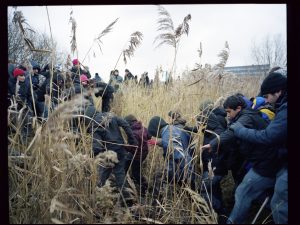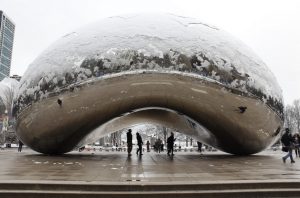
Paul Salopek spoke via Skype from somewhere in Saudi Arabia to the summer 2013 class of Columbia Links teen journalists at Columbia College Chicago. Here is an edited transcript by Matthew Wettig, Links mentor and senior at Lane Tech High School. Wettig is the editor of “The Warrior”, the school newspaper.
In early 2013, Salopek began his journey in Ethiopia, the birthplace. Salopek aims to complete his 21,000-mile trek by 2020, concluding the trip at the southern tip of Chile.
Throughout his expedition, Salopek will be chronicling the process. Every 100 miles he composes a “narrative milestone,” which includes a visual panorama of his current location, photographs, a sound clip, along with a brief interview with local peoples.
(To find out more about his journey, go to the Out of Eden Walk website. To read some of his stories and dispatches, what he calls “slow journalism,” visit National Geographic’s website.
Columbia Links: What made you want to travel around the world?
Paul Salopek:I was raised overseas. It’s what I’ve done since childhood. In contrast to most people, it seems pretty strange for me to stay in one place for too long. I was raised a nomad, which in turn influenced my work. I guess I found a job that lets me fulfill my lifestyle–living out of a backpack.
CL:What was your motivation to re-create the first journey of mankind?
PS:My background was in science. I’ve never taken a single journalism course in my life. I studied to be a field biologist; like a forest ranger, something along those lines. After college, I was not able to find a job that pertained to my degree. I kind of fell into journalism by accident. This is a long-winded way of saying that science initially was my motivation for it. I learned all about our initial diaspora from Africa, 60,000-70,000 years ago, during my education. All of us are Africans, all you have to do is go far enough back. I like that this journey belongs to all of us, not just you or me. Using ancient migration as a map, I’m able to delve into deep history, while at the same time functioning as a conventional reporter regarding what’s happening in the modern world.
CL:What were the struggles of constantly travelling when you were younger?
PS: When you’re as young as I was, 6-,7-years-old, you’re very adaptive. I had no say in it. I went to kindergarten in the U.S. I’m sure I was unhappy to leave behind my friends to be shipped down to the central Mexican plateau. My world then became one
of hand-plowed cornfields, volcanoes, copper coins, cobblestone streets and mud brick houses. I basically didn’t just grow up in another place, but another time. Looking back now, I was just a typical American kid being dropped head-first into the life of a Mexican child. I probably went through an unhappy period of time, to be honest. I don’t really remember. The memories I do have are the ones I just described. I lived as a Mexican child, and I still hold a chunk of Mexico in my psyche. The only negative I can think of would be a slight sense of loneliness.

CL: What kind of assumptions do people make of you as you traverse on your journey?
PS:Huge assumptions fly both ways, still. Take a step further back, imagine me working in Africa for 15 years. What kind of assumptions do you think are made when a white guy is walking through, say, a Congolese village? The “skin game” is very strong in Africa — rightfully so with it’s colonial history. The perception there is that I’m an aid worker, some rich guy on vacation–I immediately become a walking dollar sign–or I’m there with big business, as a mining engineer or something. Just like how certain stereotypes are imposed upon me, I equally have to fight to avoid making stereotypes of my own. Who are the Congolese? Are they poor? Are they suffering? Most of what you read about Africa in the news is BS. The stuff I read in American news about Africa makes me sick. Most of what is written are tragedies. I’m not saying this because I’m naive, but Africa is one of the overall happiest places I’ve ever been to. Yes, there’s poverty. Yes, there’s disease but family bonds are extremely strong. The extended family is the foundation for everything, something Americans lost generations ago.
CL: Can you describe your experiences with different cultures in your travels and how they’ve affected you?
PS: With this experience, I’m trying to strip all the crutches of normal reporting. By using my feet as transportation, I’m moving through stories and cultures slowly. For example, in Ethiopia I started out in the Rift Valley in a pastoral society, and that was the first region I walked through. The difference is where normally I would fly into the capital city and drive past 27 villages to get to village X, now I’m walking through each place I would normally miss, capturing what’s going on there. I have no air-conditioned car and no translator. I have a cargo camel and a local who speaks enough English for me to get by. I’d like to think that this adds a deeper level of insight to my work.
CL: What do you hope that Americans will take from your work?
PS: I have the hope that not just Americans, but all of us who live in this digitally driven world, will learn the value of slowing things down. To enjoy reading and writing text longer than a tweet. I worry we’re raising a generation of young people who have lost the ability to focus. The ability to experience the joy of reading a sustained narrative.







Be First to Comment